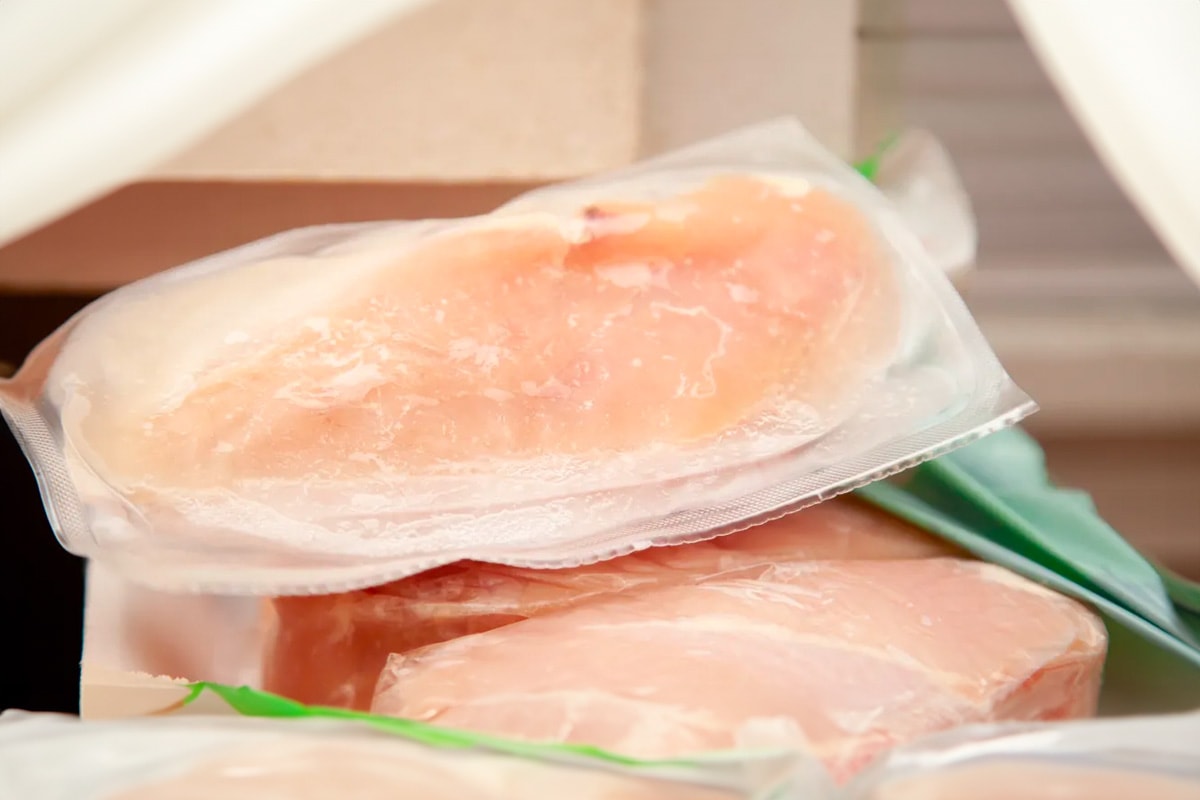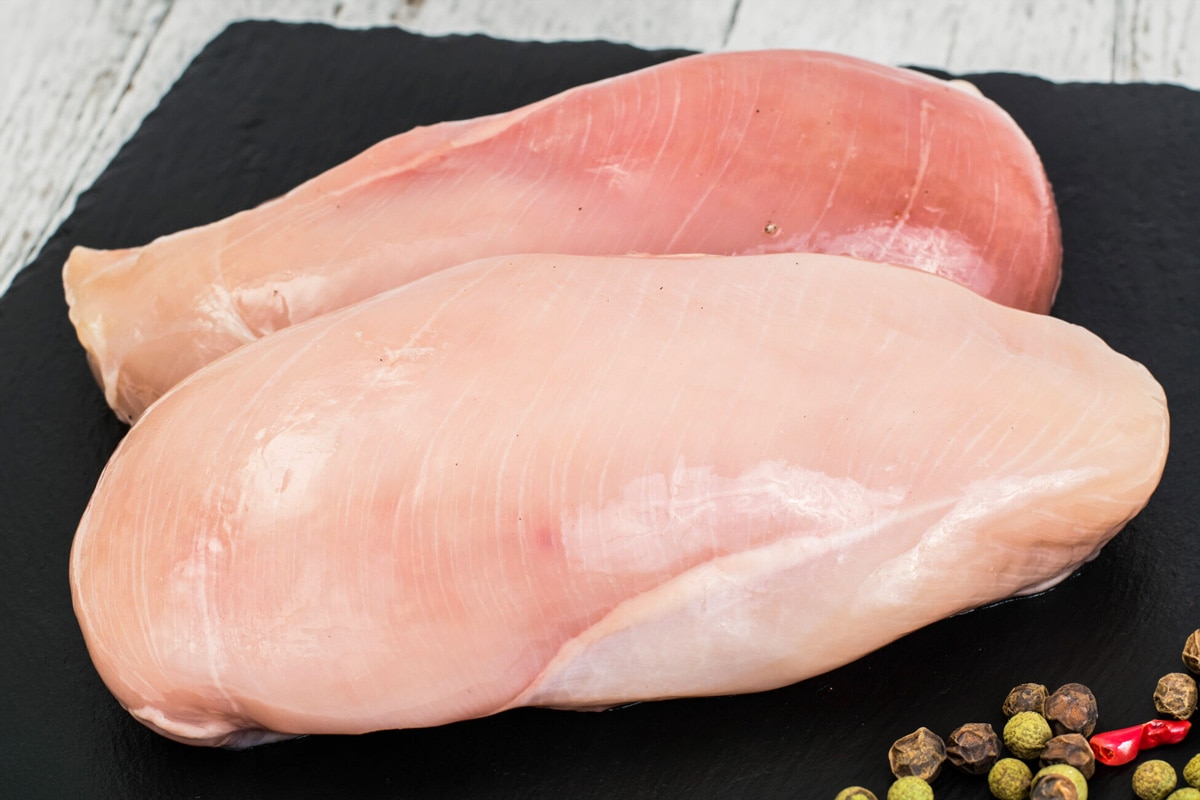Are you tired of throwing out chicken that’s been in your freezer for too long? Do you ever wonder how long you can freeze chicken breasts before they go bad? Well, let’s cover everything you need to know about freezing chicken breasts, including how long they can be frozen and how to properly defrost them.

Understanding the freezing process is crucial when it comes to preserving the quality and safety of your food. When chicken breasts are frozen, the water inside the cells expands and forms ice crystals, which can damage the cell walls and affect the texture and flavor of the meat.
That’s why it’s important to freeze chicken breasts as quickly as possible and at the optimal freezing temperature. But how long can you freeze chicken breasts before they lose their quality? Let’s find out.
Article Takeaways
- Freezing chicken breasts can help preserve their quality and safety, but it’s important to do it properly.
- Chicken breasts can be frozen for up to 9-12 months, but the optimal freezing duration is 6 months.
- To properly freeze chicken breasts, make sure they’re fresh, wrap them tightly, and label them with the date. When defrosting, do it in the fridge or under cold running water, and always follow safety measures.
Optimal Freezing Duration for Chicken Breasts
The optimal freezing duration for chicken breasts is up to 9 months, ideally up to 6 months. The less you will keep the chicken breasts in the fridge – the better texture you will get in the end.
While you can technically freeze chicken for longer, the quality and taste will start to deteriorate after this point. It’s important to note that the quality of the chicken before freezing will also impact how long it can be frozen for.
To ensure your chicken stays fresh and tasty, follow these tips:
- Freeze chicken as soon as possible after purchasing or cooking
- Use freezer-safe bags or containers to prevent freezer burn
- Label bags or containers with the date of freezing to keep track of how long it’s been frozen
- Thaw chicken in the refrigerator, not at room temperature, to prevent bacteria growth
By following these tips and sticking to the optimal freezing duration, you can ensure your frozen chicken breasts taste just as good as fresh ones.
How to Properly Freeze?

Preparation
Before freezing chicken breasts, it is important to properly prepare them. Start by washing your hands and the chicken thoroughly. Then, trim any excess fat and remove the skin if desired. Next, cut the chicken into portions that will be easy to use later on.
Packaging
Proper packaging is key to keeping your chicken breasts fresh in the freezer. Use airtight containers or freezer bags to prevent freezer burn and keep out moisture. If using freezer bags, make sure to remove as much air as possible before sealing.
Label the containers or bags with the date and contents to help keep track of what you have in the freezer.
Storage
Once your chicken breasts are properly prepared and packaged, it’s time to store them in the freezer. Make sure to place them in the back of the freezer where the temperature is the coldest.
Keep the temperature at 0°F (-18°C) or below to ensure the chicken stays fresh.
Remember to never refreeze raw chicken that has been thawed. Instead, thaw it in the refrigerator or in cold water before cooking.
And always cook chicken to an internal temperature of 165°F (74°C) to ensure it is safe to eat.
Freezing chicken breasts can be a great way to save time and money, but it’s important to do it correctly to ensure the chicken stays fresh and safe to eat. By following these simple steps, you can enjoy delicious chicken dishes anytime without worrying about spoilage or freezer burn.
How to Defrost?

Refrigerator Thawing
One of the safest ways to defrost chicken breasts is to thaw them in the refrigerator. Simply place the frozen chicken breasts in a container or on a plate and place them in the refrigerator. It’s important to note that this method can take anywhere from 24 to 48 hours, depending on the size of the chicken breasts.
Cold Water Thawing
If you’re short on time, you can also thaw chicken breasts in cold water. Place the frozen chicken breasts in a resealable plastic bag and submerge them in a bowl of cold water.
Change the water every 30 minutes until the chicken is thawed. This method can take anywhere from 1 to 3 hours, depending on the size of the chicken breasts.
Microwave Thawing
Another quick method for defrosting chicken breasts is to use the microwave. Place the frozen chicken breasts in a microwave-safe dish and defrost them on the defrost setting. It’s important to monitor the chicken carefully, as it can start to cook in some spots if left in the microwave for too long.
Personally, I don’t like using this method as the texture of the meat will deteriorate. Use it only in exceptional cases.
No matter which method you choose, it’s important to cook the chicken as soon as it’s fully thawed to ensure it’s safe to eat. And remember, never refreeze chicken that has been thawed.
Safety Measures
- Always make sure that your chicken breasts are fresh before freezing them. If the chicken breasts are already spoiled or have passed their expiration date, it’s not safe to freeze them. For comprehensive food safety guidelines, visit Safe Food Handling Guidelines.
- Before freezing, make sure to wrap your chicken breasts tightly in plastic wrap or aluminum foil to prevent freezer burn. Freezer burn can cause the chicken to become dry and tough, and it can also affect the taste. To learn more about preventing freezer burn and maintaining food quality in the freezer, check out Freezer Burn Prevention Tips
- Label your chicken breasts with the date you froze them so that you can keep track of how long they’ve been in the freezer. This will help you avoid eating chicken that has been in the freezer for too long.
- When thawing your chicken breasts, always thaw them in the refrigerator. This will help prevent the growth of harmful bacteria that can cause foodborne illnesses.
- Never refreeze chicken breasts that have already been thawed. Once you’ve thawed your chicken, it’s best to cook it immediately.
By following these safety measures, you can ensure that your frozen chicken breasts are safe to eat and will taste great when you’re ready to cook them.
Effects of Long-Term Freezing on Chicken Breasts

When it comes to freezing chicken breasts, time can be both a friend and a foe. On the one hand, freezing chicken can extend its shelf life and preserve its quality. But on the other hand, if left frozen for too long, our once succulent chicken may experience some changes.
One potential effect of long-term freezing is a loss of moisture.
As the frozen chicken sits in the icy depths of your freezer, moisture within the meat can gradually evaporate, leading to a drier texture. However, fret not, for this doesn’t mean you’re doomed to dry and flavorless poultry.
There are ways to mitigate this effect and keep your chicken juicy and tender, which we’ll explore later on.
Another factor to consider is the potential for freezer burn. Ah, the nemesis of all frozen foods! Freezer burn occurs when the surface of the chicken is exposed to air, causing it to become dehydrated and develop those unappetizing white or grayish patches.
But fear not, brave culinary warriors! With proper packaging and storage techniques, we can shield our chicken from the clutches of freezer burn and ensure its delectable taste remains untarnished.
Now, you might be wondering, “How long is too long? When should I bid farewell to my frozen chicken?” While chicken can technically be stored in the freezer indefinitely, it’s best to consume it within a certain timeframe to maintain its peak quality. The general consensus among experts is to consume frozen chicken within 9 to 12 months for optimal taste and texture.
But hey, don’t despair if you stumble upon that ancient pack of chicken breasts that’s been marooned in your freezer for over a year. It may not be at its prime, but with a little culinary magic, you can still transform it into a delightful meal.
Just remember to give it some extra love and attention during the cooking process to ensure maximum deliciousness.
🤔 Answering Your Questions:
What Happens if You Freeze Chicken Breasts for Too Long?
Freezing chicken breasts for an extended period can lead to moisture loss, resulting in a drier texture. Additionally, there is a risk of freezer burn if the chicken is not properly packaged, which can affect its taste and appearance.
Can You Freeze Chicken Breasts in Their Original Packaging?
It is not recommended to freeze chicken breasts in their original packaging, as it may not provide sufficient protection against freezer burn. It’s best to transfer the chicken to freezer-safe bags or airtight containers to maintain its quality.
Can I Freeze Chicken Breasts That Have Been Cooked?
Yes, you can freeze cooked chicken breasts. Allow them to cool completely before wrapping them tightly in freezer-safe packaging. When reheating, make sure to heat them to the appropriate internal temperature to ensure safety.
How Can I Prevent Freezer Burn on Chicken Breasts?
To prevent freezer burn, ensure the chicken breasts are well-sealed in airtight packaging, removing as much air as possible before sealing. Consider using freezer-specific bags or vacuum-sealing methods to provide an extra layer of protection.
Can I Marinate Chicken Breasts Before Freezing Them?
It’s generally not recommended to marinate chicken breasts before freezing. The marinade’s flavors can diminish during the freezing process, and the texture of the meat may change. It’s best to freeze the chicken breasts plain and marinate them after thawing.
Bottom Line
Have you tried freezing chicken breasts before? We’d love to hear about your experiences and tips! Please share your thoughts in the comments below.

Leave a Reply